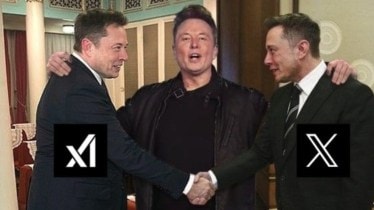Elon Musk announced on Friday that his artificial intelligence startup, xAI, has merged with his social media platform, X, in an all-stock deal valuing xAI at $80 billion and X at $33 billion.
“xAI and X’s futures are intertwined,” Musk wrote in a post on X. “Today, we officially take the step to combine data, models, compute, distribution, and talent.” He added that the merger would “unlock immense potential by blending xAI’s advanced AI expertise with X’s massive reach.” The deal was valued at $45 billion, with $12 billion in debt.
Good job, guys 😂 https://t.co/9fx1i6Qjrc
— Elon Musk (@elonmusk) March 29, 2025
Since both companies are privately held and under Musk’s control, the transaction likely involved a stock swap, compensating X investors with xAI shares. Both firms share key investors, including Andreessen Horowitz, Sequoia Capital, Fidelity Management, Vy Capital, and Saudi Arabia’s Kingdom Holding Co.
Musk, also the CEO of Tesla and SpaceX, acquired Twitter for $44 billion in late 2022, later renaming it X after implementing aggressive cost-cutting measures. Following Friday’s announcement, X CEO Linda Yaccarino posted, “The future could not be brighter.”
Musk launched xAI less than two years ago with the goal of “understanding the true nature of the universe.” The startup has been a direct competitor to OpenAI, the AI company Musk co-founded in 2015 as a nonprofit research lab before later parting ways. Recently, Musk has been embroiled in legal and public disputes with OpenAI and its CEO, Sam Altman, over the company’s direction.
xAI has been developing large language models and AI software, competing with OpenAI, Google, Microsoft, Meta, and others. Its chatbot, Grok, is already integrated into X. In June, xAI announced plans to build a supercomputer in Memphis, Tennessee, to train Grok, and by September, part of the system—now called Colossus—was online.
However, xAI’s rapid expansion in Memphis has sparked concerns among environmental and public health advocates, citing a lack of community involvement and oversight. Colossus is powered by natural gas turbines, and xAI plans to construct a graywater facility nearby.
Last year, xAI was valued at around $50 billion in a financing round. Bloomberg recently reported that the company was in talks to raise funds at a $75 billion valuation. In comparison, OpenAI was nearing a $260 billion valuation in February, while Anthropic was valued at $61.5 billion in a deal closed this month.
Beyond his business ventures, Musk has been a key figure in Washington, D.C., during President Donald Trump’s second administration. After contributing nearly $300 million to Trump’s 2024 campaign and other Republican causes, Musk was appointed to lead the Department of Government Efficiency (DOGE), tasked with cutting government jobs, reducing spending, and eliminating regulations—changes that could benefit his various enterprises.
This isn’t Musk’s first major merger. In 2016, Tesla acquired SolarCity, a solar panel installer founded by Musk’s cousins, Lyndon and Peter Rive, for $2.6 billion. Tesla shareholders later sued, claiming the deal was a bailout that personally benefited Musk, but a Delaware court ruled in his favor, allowing the acquisition to stand without financial penalties.
